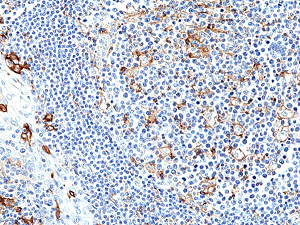Further Information
Alternate Names/Synonyms:
Programmed Death Ligand 1; PDCD1 Ligand 1; CD274; B7-H1; B7 Homolog 1
N/A
32160000
liquid
Liquid. 50% Glycerol/PBS with 1% BSA and 0.09% sodium azide.
Avoid freeze/thaw cycles.
A peptide corresponding to the C-terminus of human PD-L1.
Recombinant Antibody. This antibody reacts to human PD-L1 (CD274) (B7-H1). Applications: WB, IHC. Source: Rabbit. Liquid. 50% Glycerol/PBS with 1% BSA and 0.09% sodium azide. Programmed death ligand 1 (PD-L1, B7-H1 or CD274) is a member of the growing B7 family of immune proteins that provide signals for both stimulating and inhibiting T cell activation. PD-L1 is a transmembrane protein involved in suppressing the immune system and rendering tumor cells resistant to CD8+ T cell-mediated lysis through binding of the Programmed Death-1 (PD-1) receptor. PD-L1 is widely expressed in several organs such as heart, skeletal muscle, placenta and lung, and in lower amounts in thymus, spleen, kidney and liver. Overexpression of PD-L1 may allow cancer cells to evade the actions of the host immune system. In renal cell carcinoma, upregulation of PD-L1 has been linked to increased tumor aggressiveness and risk of death, and, in ovarian cancer, higher expression of this protein has lead to significantly poorer prognosis. PD-L1 has also been linked to systemic lupus erythematosus and cutaneous melanoma. When considered in adjunct with CD8+ tumor-infiltrating lymphocyte density, expression levels of PD-L1 may be a useful predictor of multiple cancer types, including stage III non-small cell lung cancer, hormone receptor negative breast cancer and sentinel lymph node melanoma.
Q9EP73
Vial
Programmed death ligand 1 (PD-L1, B7-H1 or CD274) is a member of the growing B7 family of immune proteins that provide signals for both stimulating and inhibiting T cell activation. PD-L1 is a transmembrane protein involved in suppressing the immune system and rendering tumor cells resistant to CD8+ T cell-mediated lysis through binding of the Programmed Death-1 (PD-1) receptor. PD-L1 is widely expressed in several organs such as heart, skeletal muscle, placenta and lung, and in lower amounts in thymus, spleen, kidney and liver. Overexpression of PD-L1 may allow cancer cells to evade the actions of the host immune system. In renal cell carcinoma, upregulation of PD-L1 has been linked to increased tumor aggressiveness and risk of death, and, in ovarian cancer, higher expression of this protein has lead to significantly poorer prognosis. PD-L1 has also been linked to systemic lupus erythematosus and cutaneous melanoma. When considered in adjunct with CD8+ tumor-infiltrating lymphocyte density, expression levels of PD-L1 may be a useful predictor of multiple cancer types, including stage III non-small cell lung cancer, hormone receptor negative breast cancer and sentinel lymph node melanoma.
Protein A purified.
Rabbit
This antibody reacts to human PD-L1 (CD274) (B7-H1).
Non-hazardous
Primary Antibodies
12352203
Stable for at least 1 year after receipt when stored at -20°C.



